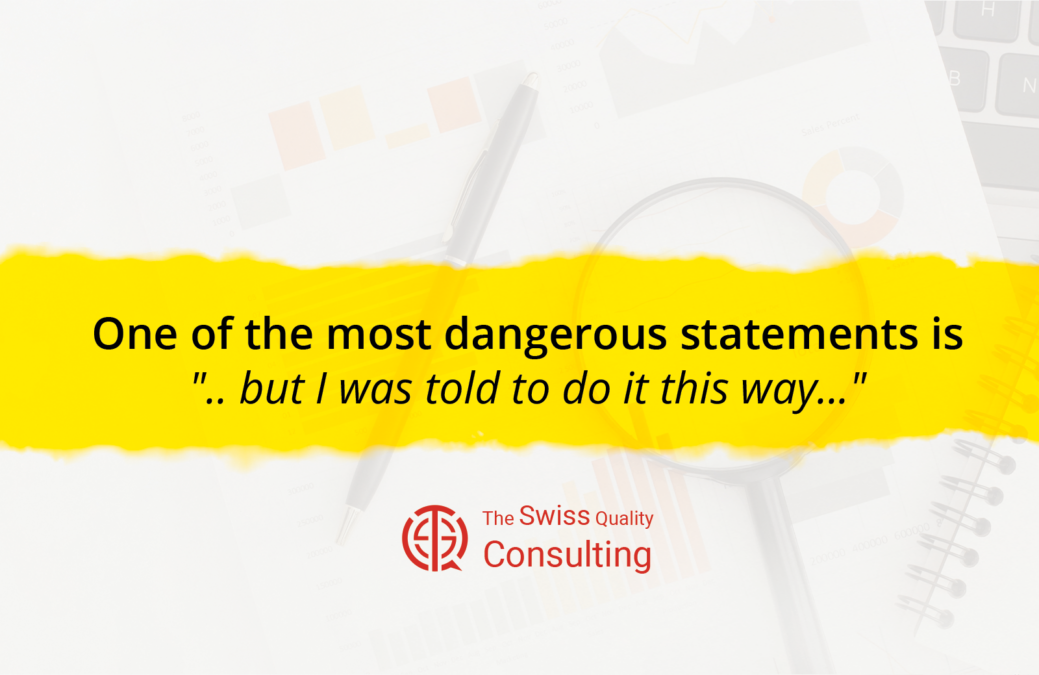The Danger of Blind Obedience: “But I Was Told to Do It This Way…”
In our complex and ever-evolving world, individuals often find themselves navigating a maze of instructions, rules, and expectations. While following guidance and adhering to established norms is often necessary and beneficial, there are instances where unquestioning obedience can lead to unintended consequences. The statement, “but I was told to do it this way…” encapsulates a mindset that, if unchecked, can prove detrimental in various aspects of life.
Critical Thinking and Autonomy:
At its core, the phrase reflects a lack of critical thinking and personal autonomy. Blindly adhering to instructions without a deeper understanding of the underlying rationale can stifle one’s ability to think independently and make informed decisions. This can be especially problematic in educational settings, where rote memorization and strict adherence to curriculum guidelines can hinder the development of critical thinking skills.
Education should encourage students to question, explore, and engage with their subjects beyond the mere transmission of information. When students are encouraged to ask “why” and challenge existing knowledge, they develop the capacity to analyze problems and devise creative solutions. This critical thinking skill becomes invaluable as individuals transition into the workforce and face increasingly complex challenges.
Professional Growth and Innovation:
In the professional realm, blind obedience can stagnate progress and hinder innovation. Employees who simply follow established protocols without questioning or seeking better alternatives may miss opportunities to streamline processes, improve efficiency, and contribute to the growth of their organizations.
In many industries, innovation and adaptability are key drivers of success. Businesses that encourage their employees to think critically and challenge the status quo often find themselves at the forefront of industry advancements. This not only fosters a culture of continuous improvement but also ensures long-term sustainability in a rapidly changing world.
Personal Responsibility and Accountability:
The statement, “but I was told to do it this way…,” can also be used as a shield to deflect personal responsibility and accountability. When individuals use this phrase to justify their actions, they shift the blame onto others, avoiding ownership of their decisions and their potential consequences.
Taking responsibility for one’s actions is a hallmark of maturity and ethical behavior. It demonstrates integrity and a willingness to learn from mistakes. In contrast, consistently relying on the excuse of following orders can erode trust and undermine personal growth.
The Importance of Context:
It’s important to note that there are situations where following instructions without deviation is essential. Safety-critical industries, such as aviation and healthcare, rely on strict adherence to established protocols to ensure the well-being of individuals. In such contexts, there is little room for improvisation, and following well-defined procedures is paramount.
However, even in these high-stakes environments, there is still a place for critical thinking and adaptability. Professionals in these fields are often trained to make informed decisions when unforeseen circumstances arise, and they must use their judgment to deviate from standard procedures when necessary to ensure safety.
Encouraging a Balanced Approach:
To mitigate the dangers associated with the statement in question, it is crucial to foster a balanced approach to instruction and obedience. This approach should involve:
1. Promoting Critical Thinking: Encouraging individuals, especially in educational settings, to question, analyze, and engage with information and instructions critically.
2. Empowering Autonomy: Giving individuals the freedom to make decisions within established boundaries, allowing for creativity and innovation.
3. Emphasizing Personal Responsibility: Holding individuals accountable for their actions and encouraging them to learn from their mistakes.
4. Recognizing the Value of Expertise: Acknowledging that expertise and experience play a significant role in decision-making, and respecting the guidance of experts in relevant fields.
The statement, “but I was told to do it this way…,” highlights the importance of striking a balance between obedience and critical thinking. While there are situations where following established protocols is necessary, unquestioning obedience can impede personal growth, hinder innovation, and deflect responsibility. Encouraging individuals to think critically and make informed decisions is essential in navigating our complex world effectively.
#CriticalThinking #Autonomy #PersonalResponsibility #Innovation #Balance









